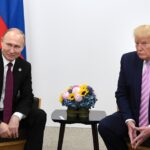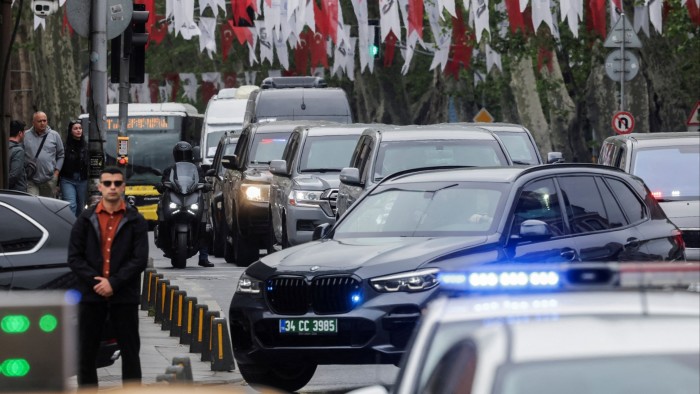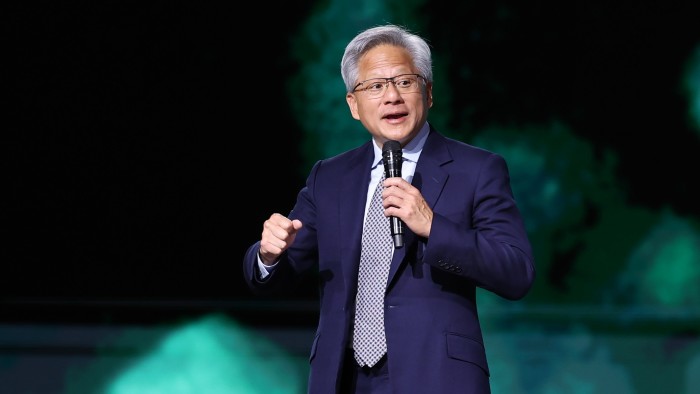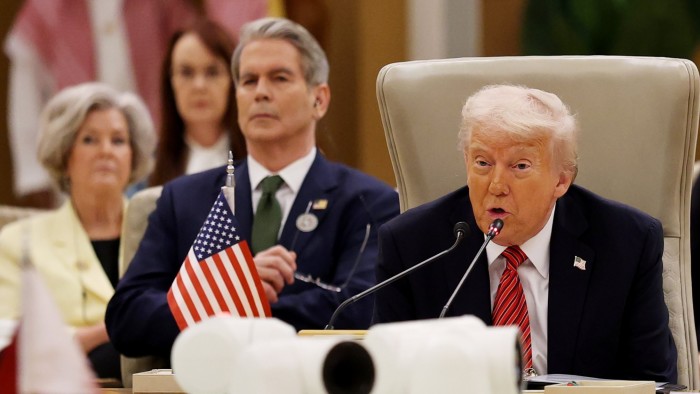How Ukraine lost hundreds of millions on arms deals gone wrong
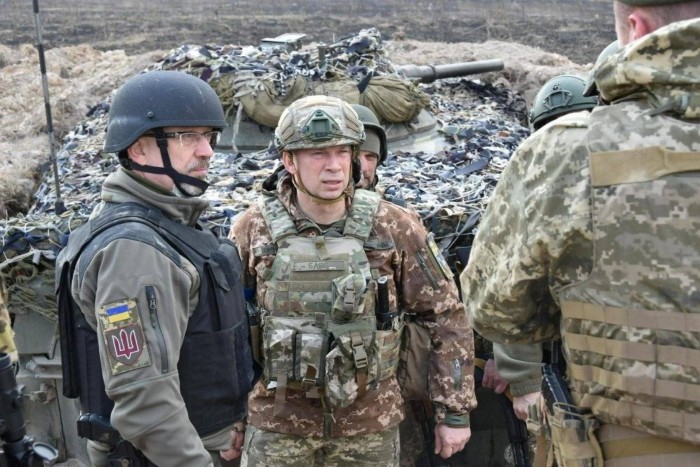
In 2020 Tanner Cook, a 28-year-old from Arizona, opened a small ammunition shop on a dusty road off a highway on the outskirts of Tucson. Cook’s fledgling venture was located in a single-floor beige concrete commercial space with a temporary sign on the wall reading: “OTL IMPORTS”.
Cook’s early customers were local gun enthusiasts, with one Tucson radio host giving OTL Imports a plug to help his “real good buddy” get his company off the ground. “He sells ammo, he sells guns and he’s got really good prices,” he said. “He’s a real good dude!”
A little over two years later Cook, who wears his black hair slicked back and is fond of pairing black suits with sunglasses, received a remarkable order: his tiny ammo shop signed a €49mn contract to supply the Ukrainian military in its war with Russia.
Since the contract, under which OTL received a 35 per cent upfront payment of €17.1mn in November 2022, the young local store owner has become a player in the international arms market. Cook’s Facebook profile picture apparently shows him standing in front of a Black Hawk helicopter shaking hands with a US army official under the caption: “No more bodies left to stack”.
But the ammunition Cook sold never arrived in Ukraine. The Ukrainian side has since won a ruling against OTL in arbitration proceedings in Vienna but has not yet recovered the money it paid to the company.
Russia’s invasion of Ukraine in 2022 marked Europe’s single-biggest weapons procurement rush since the second world war. While Ukraine’s Nato allies delivered vast amounts of military aid, the country’s own officials were also forced to find ways to supply troops fighting across a 1,000-kilometre front line.
A Financial Times investigation, based on leaked Ukrainian state documents, court filings and dozens of interviews with procurement officials, weapons dealers and manufacturers, and detectives, has uncovered how hundreds of millions of dollars Kyiv paid to foreign arms intermediaries to secure vital military equipment has gone to waste over the past three years of war.
As Ukraine continues to battle against Russia’s ammunition production superiority, the country has been left exposed to the ruthless vagaries of the international weapons market. In several cases Kyiv paid out large amounts in advance to little-known companies for materiel that to this day has never arrived. In other cases officials say that weapons sold at vastly inflated prices as global demand soared — the arms industry equivalent of surge pricing — arrived in an unusable condition.
To date, Ukraine has paid out $770mn in advance to foreign arms brokers for weapons and ammunition that have not been delivered, according to figures from Ukraine’s Ministry of Defence, as well as documents seen by the FT. This represents a significant chunk of Ukraine’s annual $6bn-$8bn weapons budget spent from its own state funds since the start of the invasion.
At the same time, some foreign arms companies say they have been the victims of infighting and corruption by Ukrainian officials and state weapons brokers, which may account for some of the missing millions.
The Kyiv government is attempting to clean house. Several former Ukrainian arms procurement officials who worked on these deals have been fired by the Zelenskyy administration, with some indicted on corruption charges, and dozens of arms contracts are now under investigation by the country’s law enforcement agencies. Other deals are locked in painfully slow arbitration proceedings in places such as London and Geneva.
Several senior former Ukrainian officials overseeing arms procurement in the first three years of the war defended the use of foreign intermediaries, saying they helped to broker critical and sensitive arms deals at a time when the country needed to source vast amounts of ammunition made by countries that — for geopolitical reasons — did not want to be seen to sell weapons to Ukraine directly.
In one instance, in April 2022, according to Ukrainian court documents, the Ukrainian state weapons broker Ukrspetsexport purchased 120mm mortars from Sudan from sellers later found to have close ties to Russia’s FSB security service, as well as Yevgeny Prigozhin’s Wagner Group, which later would use Russian prisoners to fight a brutal war of attrition against Ukrainian soldiers.

This shadowy procurement process may have helped Ukraine fight the war, but it has meant grappling with freewheeling foreign entrepreneurs whose alliances can be purely mercantile and zero-sum.
“Arms dealers are traders in death,” says Oleksiy Reznikov, Ukrainian defence minister until 2023. “They are absolutely pragmatic and cynical. They have no concept of justice. These are not concepts that exist in their world. They say ‘I have it in my warehouse. If you want it, buy it. If you don’t, I’ll sell it to your enemy.’”
In the weeks following Vladimir Putin’s invasion in early 2022 officials in Kyiv realised Ukraine only had enough ammunition to last for two months.
As the country battled for its survival, the government suspended normal weapons procurement rules and civil servants were tasked with finding non-Nato stockpiles for the army’s predominantly Soviet-era kit wherever they could.
Historically much of Ukraine’s domestic arms production was exported through various state-owned arms trading companies, which took a cut of the profit from brokering these deals. Now this process went into reverse, with the intermediaries frantically calling up their old customers and middlemen abroad to source any equipment they could.
The sudden rush to find weapons for trench warfare, which western manufacturers had long since stopped prioritising, meant demand far outstripped supply.
In 2022, Europe’s annual output of shells suitable for Ukraine’s Soviet-model artillery rounds was 600,000 — enough for just one month of fighting while still being only a third of the 1.8mn shells Russia was unleashing each month, says Reznikov.
For a group of foreign arms dealers, almost all of them American and European, Ukraine’s desperation was their opportunity. At least 10 sources connected to Ukraine’s military procurement efforts or weapons dealers cited prices of Soviet-calibre ammunition quadrupling in the first half of 2022.
Around this time Cook’s OTL Imports, though still an ammo shop in Arizona, first met officials from Progres, one of several Ukrainian state-owned intermediaries that brokers weapons imports and exports for the state.
Cook, according to two people familiar with the situation, was introduced to Progres by an American-Ukrainian businessman called Mykola Karanko, who had more than a decade before helped to broker a large deal between Progres and the Iraqi state.
The 2009 Iraq transaction ended in a civil court case in Texas where the Ukrainian intermediaries were ordered to pay over $60mn to a US businessman for cutting him out of the deal. Karanko, who was accused in court of attempting to pay kickbacks to Iraqi officials on behalf of the Ukrainian side, did not respond to questions from the FT.
Cook said he could obtain shells and mortar mines from a manufacturer in Serbia, and received the advance payment of $17.1mn. Advance payments like these are common in arms sales where various parts of the supply chain, such as foreign factories, do not want to be left as creditors to countries at war.
But OTL — according to several Ukrainian officials — never delivered the shells or returned the payment. A report by Ukraine’s State Bureau of Investigation seen by the FT found that OTL did not have the necessary certification to export and transport the ammunition.

Since the Ukraine deal, Cook appears to have expanded his business far from Arizona, attending an arms fair in Abu Dhabi. One of his now deleted social media posts from last June features a man in a private plane wearing a black balaclava with what appears to be a Bloody Mary in front of him, blowing smoke from a cigarette. Cook’s caption reads: “cigarettes and private jets”.
Progres declined to answer questions from the FT about why it entered into the deal with OTL. It says that it had won a decision against OTL from the Vienna International Arbitral Centre, an international commercial arbitration body, to recover €21.3mn, which includes the advance payment as well as legal costs, interest and penalty payments.
Progres tells the FT it was “trying every possible way” to have the arbitration decision recognised in the US, and said that OTL was under further investigation in Ukraine over the deal.
Ukraine’s National Anti-Corruption Bureau, a law enforcement agency, confirms to the FT in writing that it was investigating OTL. Ukrainian detectives said they had been trying to track where the money paid to OTL had ended up. No charges against Cook or the company have been brought.
Lawyers for OTL and Cook say their clients deny any wrongdoing. They did not respond to detailed questions from the FT regarding the Ukrainian allegations.
The OTL contract is just one of at least 30 deals struck between Ukraine and foreign arms suppliers contained in documents seen by the FT that resulted in state funds being spent on ammunition and equipment that never arrived, arrived only in part, or arrived in an unusable state.
Denys Sharapov, deputy defence minister in charge of foreign contracts until September 2023, tells the FT that he had been deluged with offers for weapons and ammunition by small or relatively new players eager to profit from the conflict.
“I was getting tens of commercial proposals from people who were trying to start their business. It’s normal. There are always new people who want to come up,” says Sharapov, who adds he received about 25,000 weapons offers during his 18-month tenure. He compared the task of Ukrainian defence officials at the start of the Russian invasion to trying to put out a house on fire “with whatever you had”.
In late 2022, Ukraine appeared to have gained the upper hand in the conflict. Its troops liberated Kherson in November that year and Russian forces were forced to retreat across the Dnipro river. But the heavy fighting continued, leaving the military still desperate for artillery shells.
It was around that time that Oleksiy Petrov, then head of Spetstechnoexport — one of Ukraine’s largest state weapons intermediaries — received an offer from an American company called Regulus Global he could not refuse.
Petrov knew that Ukraine’s biggest military procurement challenge was that some of the largest producers of weapons and ammunition were countries diplomatically close to Russia that did not want to be seen directly supplying its enemy.
But Regulus, founded and led by a goatee-wearing American former Merrill Lynch stock broker called Will Somerindyke, had an audacious solution. It told Petrov that it could source on the global market tens of thousands of rounds of exactly the type of 155mm artillery shells Ukraine needed to work with the Nato military equipment it had started to receive that summer.

“The offer was quite attractive and very serious,” says Petrov, who is in his late forties and worked out of a Kyiv office with different-sized artillery shells lined up in a corner next to his desk.
Regulus, based in an office close to the US Naval Air Station Oceana in Virginia Beach, was founded in 2012 as a military logistics start-up. Soon it began to carve out a niche for sourcing and transporting old stockpiles of weapons. But its big break came during the Syrian civil war, when it won Pentagon contracts to find and transport weapons to US-backed rebels.
Before founding Regulus, Somerindyke had some brushes with controversy. In 2012 he was accused by Virginia’s state financial regulator, the SCC, of having engaged in “fraud and deceit” during a sale of shares in a private start-up to a local dentist. In a parallel case Finra, the US financial watchdog, issued him with a $10,000 fine, and suspended his broker licence.
Somerindyke, who never admitted nor denied the allegations made against him by the Virginia regulator, says that he had “made the mistake of beginning to raise capital for a media start-up before my broker’s licence had expired”, and had reached an agreement with Finra where he would only pay the historical fine if he decided to reactivate his licence.
In 2016, Regulus was sued by the widow of an American working on a training programme in Bulgaria who was killed when a 30-year-old grenade exploded. Regulus, which was one of several Pentagon contractors named in the lawsuit, had not been in charge of the training programme but had provided equipment to the company running it. The case was eventually settled confidentially.
None of this seemed to matter to Petrov, the Spetstechnoexport boss, who trusted the Pentagon-endorsed company’s reputation for delivering hard-to-find military equipment in the international arms market.
Somerindyke tells the FT that shortly after Russia invaded in 2022 he began to receive phone calls from Ukrainian officials desperate to obtain arms to defend the country.
“[They asked us] what could we get and how quickly could we get it there,” he says. The decision to work with them had a personal dimension, he adds. “My wife is Ukrainian, her family is Ukrainian. I’ve been to the front lines . . . I am committed to this as much as anybody could be.”
By the summer of 2022, Regulus had flown in several Antonov An-124 cargo planes filled with BM-21 vehicles that fire Grad rockets, and Soviet model D-20 howitzer shells. Over 2023 Regulus says it successfully delivered 70,000 155mm shells to Ukraine.
But the supplies of old stocks of ammunition around Europe was quickly running out. The race to manufacture quantities of ammunition not needed since the second world war sparked a global scarcity, leading some suppliers to break existing contracts or dramatically increase prices.

“The supply chain was already problematic, and stocks around the world were already practically gone,” Somerindyke says. “Everybody was trying to go after the same things. It was much like the environment in Covid where masks got out of hand.”
This meant that when Regulus made its proposal to Petrov to provide tens of thousands of 155mm shells, the Ukrainian jumped at the opportunity.
The munitions in part originated from a state-owned manufacturer in a country with close ties to Russia, which was not suffering the same shortages of raw material and components. Petrov says Regulus executives told him they could navigate any political complications with the help of contacts at the US state department.
Soon afterwards Regulus had signed a contract with Spetstechnoexport worth up to $1.7bn depending on deliveries — one of the largest Ukrainian military procurement deals of the war.
Regulus says all of its business was conducted under the regulatory oversight of the US state department’s Directorate of Defense Trade Controls, the body responsible for controlling US exports of defence and military technologies.
Spetstechnoexport says it went on to make $162.6mn in advance payments and deposits to Regulus to action part of the contracts to secure the 155mm shells, as well as other payments for €14mn.
But the Ukrainian state company claims Regulus breached the terms of the contract, and has not yet repaid Kyiv its money. It says that from September 2024 Regulus ceased all contact and stopped responding to its letters. Officials in Ukraine believe Regulus spent the pre-payment on manufacturing facilities, among other things. “They used the money we sent them . . . to buy new assets,” says Petrov.
Spetstechnoexport is now trying to get back what it claims it is owed through arbitration proceedings.
Regulus strongly disputes these allegations, and says it has continued to deliver significant amounts of ammunition to Ukraine. It says it has invested in a range of supply chain resources, including in production and transportation, in order to obtain the capacity required to fulfil large contracts.
The American company says it was in fact Spetstechnoexport that failed to pay the contractually agreed amount of pre-payments of about $500mn, 30 per cent of the overall amount, to Regulus to secure the ammunition, paying the US company only around $100mn. Regulus also says that it had become a victim of dysfunction and infighting between different actors in the Ukrainian procurement process.
“I honestly feel like we are caught in the middle of a conflict between the Ministry of Defence and the state, and we just happened to be caught in there because we were the largest contractor,” says Somerindyke. “Regardless of what has been going on in Ukraine, we have continued to deliver.”
Regulus, he says, has had to make up the deposit shortfall itself to continue delivering ammunition to Ukraine. “Look, it’s caused a lot of financial stress at our company . . . we leveraged out pretty big,” he says.
Regulus tells the FT that “the current net status between Regulus and Ukraine on direct supply contracts for 155mm rounds is that Regulus is owed roughly $350mn, not the other way around”.
Petrov, who left Spetstechnoexport in March, denies this, claiming that the intermediary had not been under any contractual obligation to provide this money. The Ukrainian side has complained to the Pentagon and the US embassy in Kyiv.
Spetstechnoexport says its arbitration claim in London aims to recover $346mn from Regulus, including the pre-payments as well as outstanding debts and penalties.
In January 2024, Maryna Bezrukova, a veteran supply chain expert who had worked at the state electricity grid operator Ukrenergo, was appointed as the new head of Ukraine’s Defense Procurement Agency.
The country’s Nato partners had grown concerned after a series of domestic military procurement scandals. Bezrukova, a well-regarded and industrious civil servant known to work long hours late into the night, was given the unenviable task of carrying out a root-and-branch reform of how Ukraine’s Ministry of Defence bought weapons and ammunition.
Several months before, in September 2023, Reznikov, who had been defence minister since Russia’s invasion, was dismissed by Ukraine’s President Volodymyr Zelenskyy after several allegations that inflated prices were paid for soldiers’ food and coats, as well as a foreign ammunition deal involving three different intermediary companies.
While Reznikov was not directly implicated in the scandals, Zelenskyy at the time said the defence ministry needed “new approaches”.
Reznikov tells the FT that any faulty arms contracts were an unfortunate consequence of the urgency of arming Ukrainian soldiers fighting on the front lines at the start of the war.
“During the war there is one criterion of effectiveness: you bring a lot of weapons to the front and give them to the armed forces quickly. I’m not interested in anything else,” he says, stating the ministry did not have the time to mull over price differences. “You have guys on the front line dying without shells, and you have to put a shell in their hands every day and every night,” he says.
Reznikov says the problematic contracts represent only a part of the more straightforward overall picture. “How many contracts were signed?” he says, “and how many are in the courts?”
Two former heads of military procurement, Toomas Nakhur and Oleksandr Liev, were also placed under criminal investigation for signing off on a complex deal for shells originating from Croatia, where a $12.5mn pre-payment was allegedly spent on unrelated activities by various intermediaries.
They both strongly deny wrongdoing, stating that they were placed under unrelenting pressure to find weapons and ammunition by any means necessary in a moment when their country was fighting for its very survival.

“[Ukraine’s] general staff wanted 100 times more than we were able to buy [on the market],” says Nakhur, who also blamed any questionable deals on bad actors in the armaments market.
Once in office Bezrukova moved quickly to centralise procurement power within her agency, with the aim of increasing transparency and avoiding further bad deals, waste, or the risk of corruption.
But she tells the FT that she immediately faced constant battles with Ukraine’s state weapons intermediaries, who she claims resented her taking charge of budget funds. Bezrukova says she was put under pressure to sign contracts with manufacturers that had a history of producing poor-quality products, without naming any individual companies. “It’s about power and corruption,” she says.
One contract that she refused to authorise more payments for was the deal between Regulus and Spetstechnoexport. In September last year the American company attempted to move over its contract from the state intermediary to her agency. But the move was blocked by Bezrukova after, she claims, Regulus asked for another pre-payment.
“The money had already been partially paid, as an advance [payment], by Spetstechnoexport, and to pay an advance twice for the same product, well, you realise that this is wrong,” she says.
Regulus contests this account, saying it had never attempted to obtain double payment for the same goods, and that it simply acted to ensure there were no interruptions in its delivery of ammunition to Ukraine.
By January of this year, Ukraine’s new defence minister, Rustem Umerov, accused Bezrukova of transforming her agency “into an Amazon” that had made the country’s procurement efforts too publicly visible to its enemies, and she was fired.
Her sacking a little over a year after starting her job prompted fresh concern from Kyiv’s allies. G7 diplomats released a statement in response stressing the importance of “good governance” and to “maintain the trust of public and international partners”.
Some efforts have been made in Kyiv to stem concerns from its allies about procurement malpractice.
Four Ukrainian law enforcement agencies are investigating dozens of contracts signed with foreign arms brokers, and in some instances have opened criminal cases against former Ukrainian procurement officials. But almost none of these cases have yet resulted in charges being brought by prosecutors.
Ukraine’s Ministry of Defence says it is pursuing $309mn of advanced payments to foreign suppliers through the courts for contracts that are no longer deemed workable. It is hoping to recover the rest of the money, approximately $460mn, through pre-trial negotiations with the suppliers.
Ukrainian law enforcement documents reviewed by the FT claim that in some instances there was collusion by senior Ukrainian defence ministry officials with foreign intermediaries to use these contracts to embezzle state funds.
But detectives say the work is arduous and hindered by slow international co-operation from the US and the EU — the former of which, they say, has taken a minimum of six months to respond to mutual assistance requests and, in one case, declined to provide information about a suspect deal involving one company on the grounds of national security.
Many of the weapons brokers who descended on Kyiv at the start of the war have not returned to do business with Ukraine.
Anti-corruption activists believe that cutting out these foreign brokers is critical to reducing prices and avoiding bad deals. But, at a time when Ukraine is struggling to arm troops on its front line and the Trump administration has threatened to cut off military support to the country, some Ukrainian arms executives claim this will damage Kyiv’s self-sufficiency.
“I’m probably one of the few crazy ones that’s still left,” says Regulus’s Somerindyke, who believes that what he claimed was “bureaucratic inefficiency” had driven many foreign weapons brokers away.
Petrov, formerly of Spetstechnoexport, says that foreign intermediaries are essential for the continued supply of weapons by taking on financial and logistical risks on Kyiv’s behalf.

“The manufacturers say . . . ‘If you don’t pay [upfront], I won’t give you anything,’” he says. “There are a lot of intermediaries that say, ‘We will use our money, we will assume the risks.’”
Yet Ukrainian detectives investigating the failed arms contracts say that more allied governments need to force manufacturers to sell directly to Ukraine, cutting out the brokers and creating better price transparency.
“The more middlemen, the higher the price,” one says.
Meanwhile, OTL’s Cook — the young American arms dealer that Ukraine is trying to reclaim money from for non-delivered ammunition — has come a long way from running a small gun store in Arizona.
The American, according to various corporate registration documents, has set up several foreign ventures, including a real estate company in Kosovo and a start-up in Prague.
But Cook also suffered an expensive non-delivery of his own.
In July 2023, little more than six months after signing his career-making military contract with Ukraine, Cook met a man in Las Vegas who introduced himself as an ex-banker who specialised in doing deals in hostile environments.
Cook then flew out to Kenya, according to a complaint he made to Kenyan police, with the aim of buying $1.2mn worth of gold bars. He transferred the money to the African seller from a Wyoming-incorporated company. But unfortunately for Cook, the gold, just like the Ukrainian ammunition, never arrived.
Graphic illustration by Ian Bott




